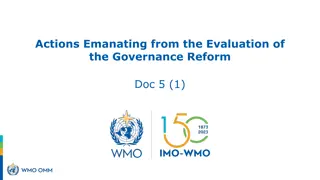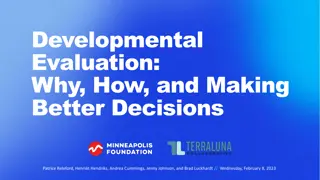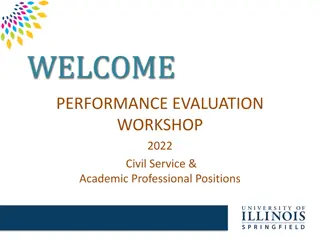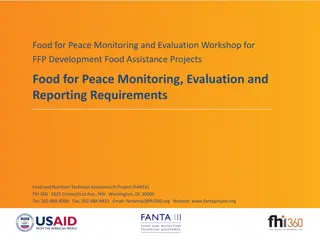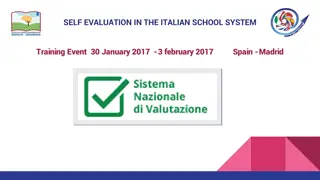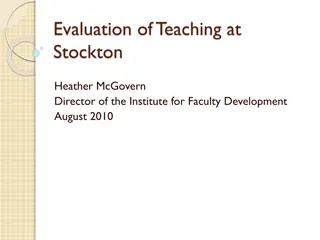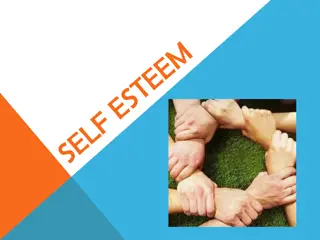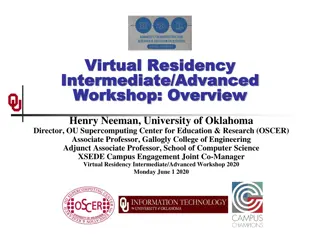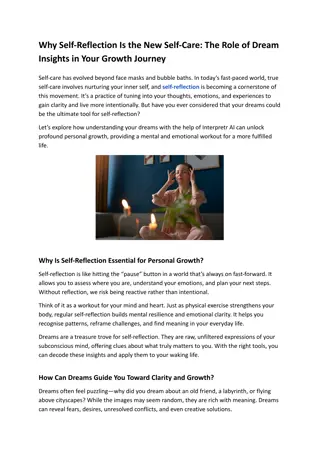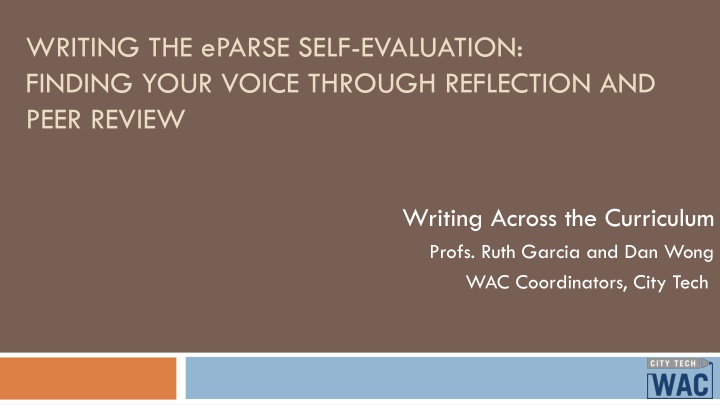
Crafting a Powerful Self-Evaluation: A Writing Workshop Guide
Dive into a two-part workshop focusing on crafting a compelling self-evaluation through guided exercises, peer review, and feedback. Learn to clarify thoughts, create outlines, and draft effectively for optimal self-reflection. Join to enhance your writing skills today!
Download Presentation

Please find below an Image/Link to download the presentation.
The content on the website is provided AS IS for your information and personal use only. It may not be sold, licensed, or shared on other websites without obtaining consent from the author. If you encounter any issues during the download, it is possible that the publisher has removed the file from their server.
You are allowed to download the files provided on this website for personal or commercial use, subject to the condition that they are used lawfully. All files are the property of their respective owners.
The content on the website is provided AS IS for your information and personal use only. It may not be sold, licensed, or shared on other websites without obtaining consent from the author.
E N D
Presentation Transcript
WRITING THE ePARSE SELF-EVALUATION: FINDING YOUR VOICE THROUGH REFLECTION AND PEER REVIEW Writing Across the Curriculum Profs. Ruth Garcia and Dan Wong WAC Coordinators, City Tech
Instructions for Getting Started For optimal experience, use Presenter View while going through the slides as some are animated. Have a pen and paper ready or a word processor to go through the exercises, take some notes, and jot down questions. Underlined words are hyperlinks that can be accessed directly from Presenter View. 2
WRITING YOUR ePARSE SELF-EVALUATION DRAFT: TWO-PART WORKSHOP PART I: Now PART II: April 2 Discuss Engage in Guided Peer Review Get Feedback Refine and Revise Clarify Refresh and Reflect Follow a Writing Plan Create an Outline Draft
PART I: Now Our goal is to help you craft a powerful cumulative self-evaluation for your ePARSE. We have designed this presentation to help you do some of the necessary preliminary thinking and planning before you start a draft. We guide you through the following: Sorting out what the self-evaluation is and is not Writing exercises that will help you get started Creating a scaffolded plan for your ePARSE self-evaluation Learning to create an outline for your self-evaluation 1. 2. 3. 4. 4
Create Your Draft: Between Now and April 2 After going through this presentation, you need to do the following: Draft your self-evaluation guided by the practices and tools presented Have your draft ready by April 2 1. 2. 5
PART II: April 2, 4-5:30PM We invite you to meet us over Zoom to: Ask questions Exchange drafts and engage in guided peer review Discuss within a multi-disciplinary group Get feedback Refine and revise 1. 2. 3. 4. 5. 6
WRITING YOUR ePARSE SELF-EVALUATION DRAFT: PART I: Now Clarify Refresh and Reflect Follow a Writing Plan Create an Outline
These Slides Will Cover Who needs to write an ePARSE self-evaluation? What is an ePARSE self-evaluation? Who are you writing your ePARSE self-evaluation for? Writing exercises A plan for your ePARSE self-evaluation The College s Mission Statement An Outline for your draft 1. 2. 3. 4. 5. 6. 7. 8
Who writes an ePARSE Self-Evaluation? In preparation for their annual evaluation, faculty members should review the year s activities and accomplishments in light of their overall goals. Candidates for reappointment should supply a cumulative evaluation of their work, beginning with a focus on the immediately preceding year, followed by a summary of prior years. Candidates for tenure should evaluate their work since their initial appointment. Candidates for promotion should evaluate their work since their last promotion. 9
What is an ePARSE Self-Evaluation? A succinct but complete narrative. Limited to three, or fewer, single-spaced pages. Assesses three areas: teaching, scholarly activities, service. Please note that lecturers are not expected to produce scholarly work, an therefore, discussion of scholarly activities is optional for those in lecturer positions. Showcases individual success in relation to success of department and college. Reflects on values, philosophy, and intellectual interests that inform teaching and scholarship. For further guidance, consult the Faculty Personnel Process Guidelines, Section I.C.9 10
Who is the Audience for an ePARSE Self-Evaluation? Department Appointments Committee P&B Review Committees (pre-tenure, multidisciplinary faculty) College Promotion Committees (multidisciplinary faculty group) Keep these audiences in mind and do the following: Contextualize your work Make sure a non-expert can understand the importance and relevance of your contributions 11
Write for a College-Wide Audience To better contextualize your individual accomplishments within your department and the college, familiarize yourself with: Your Department s goals and targets Your school s objectives The College s Mission Statement 12
CITY TECHS MISSION STATEMENT New York City College of Technology is a baccalaureate and associate degree- granting institution committed to providing broad access to high quality technological and professional education for a diverse urban population. City Tech s distinctive emphasis on applied skills and place-based learning built upon a vibrant general education foundation equips students with both problem-solving skills and an understanding of the social contexts of technology that make its graduates competitive. A multi-disciplinary approach and creative collaboration are hallmarks of the academic programs. As a community City Tech nurtures an atmosphere of inclusion, respect, and open-mindedness in which all members can flourish. 13
Exercise 1: Getting Started Prompt: You meet Dr. Davidson at a party. She is a professor in a discipline different from your own at St. Lovelet University and is interested in your career at City Tech. How would you respond if she asked you to tell her about your favorite part of being a professor at City Tech? Exercise: Write for 3 to 5 minutes non-stop what comes to mind in answering the prompt. Be mindful that Dr. Davidson is not in your field. 14
Exercise 1: Rationale The exercise you just did is known as freewriting. It is the first step in creating an outline that will support writing a draft, and eventually your ePARSE self-evaluation. Outline Draft Freewrite (low stakes) Self-Evaluation (high stakes) 15
A Plan for your Self-Evaluation draft 1. Three areas to synthesize: Teaching Scholarly activity (optional for lecturers) Service 2. Synthesis: through-line / unifying theme 16
A Plan for your Self-Evaluation draft 3. Your story as opposed to a list of achievements 4. Three contexts to consider: Individual goals Departmental goals College- and/or University-wide goals 5. Future goals in the three areas 17
Working Towards your Draft In the next section, we will guide you through a series of exercises to get you as close as possible to an outline and a rough draft of your self-evaluation. First, we will invite you to focus on teaching, scholarly activities, and service under each of the following contexts: individual, departmental, college, and university. Next, we will invite you to look for a unifying theme to tell your unique story and how it connects to the success of your department and of City Tech. 18
Brainstorming: Teaching Think about the following questions: 1. What are the teaching accomplishments you are most proud of? 2. How do your successes in teaching contribute to the college s goals, its mission? 3. Is there an overarching theme to your teaching? 4. What are your future goals in teaching (courses, pedagogy, technology)? 21
Exercise: Write about your Teaching Write down your thoughts from the Brainstorming slide. Revise what you wrote. When doing so, check to see if you considered the following: Your audience: faculty outside of your department may need clarification for acronyms or other terms that may be exclusive to your discipline. Three contexts: Individual goals, Department goals, College/University goals. 1. 2. 22
Brainstorming: Scholarly Activities Think about the following questions: 1. What are the scholarly accomplishments you are most proud of? 2. How do your accomplishments contribute to the college s goals, its mission? 3. Is there a unifying theme to your body of work? Note: please remember that discussion scholarly activities is optional for faculty on a lecturer line. 24
Exercise: Write about your Scholarly Activities Write down your thoughts from the Brainstorming slide. Revise what you wrote. When doing so, check to see if you considered the following: Your audience: faculty outside of your department may need clarification for acronyms or other terms that may be exclusive to your discipline. Provide them with context for understanding your research accomplishments. For example, why certain journals/ conferences/events in your field are highly regarded. Three contexts: Individual goals, Department goals, College/University goals. 1. 2. Note: please remember that discussing scholarly activities is optional for faculty on a lecturer line. 25
Brainstorming: Service Think about the following questions: 1. What are the main service accomplishments you are most proud of? 2. How do your main service accomplishments contribute to the college s goals, its mission? 3. Is there a unifying theme to your service activities? 27
Exercise: Write about your Service Write down your thoughts from the Brainstorming slide. Revise what you wrote. When doing so, check to see if you considered the following: Your audience: faculty outside of your department may need clarification for acronyms or other terms that may be exclusive to your discipline. Three contexts: Individual goals, Department goals, College/University goals. 1. 2. 28
Exercise 2: Create a Plan Step I: Collect all your ideas from the three exercises you just did on Teaching, Scholarly Activities, and Service. Step II: Identify ideas that you may need to develop further. 29
Exercise 2: Rationale The writing process you just went through is called scaffolding. By pulling apart your accomplishments into three individual categories, you broke down writing about your accomplishments into components and contexts. Scaffolding is one of the most important WAC practices to support writing assignments, especially high-stakes pieces such as your ePARSE self-evaluation. 30
Taking your Draft to the Next Level Create an outline to expand on your cumulative self-evaluation draft by thinking about the following questions: 1. Where are you now professionally/in your career? And where are you going? 2. What are the overarching or unifying themes (if any) among your teaching, scholarly activities, and service? 3. How do your accomplishments thus far provide a foundation for your future career goals and trajectory within your department and at City Tech? 31
Next Steps for Part II on April 2 Write a two-page draft of your self-evaluation Jot down one to two questions about your draft Register for the April 2 workshop Join the Zoom workshop on April 2, 2024 (4-5:30PM) to refine your self-evaluation draft through self-reflection, guided peer-review, and group discussion 32
Resources Visit the Faculty Commons website to see PARSE samples from different disciplines Contact the WAC program at wac@citytech.cuny.edu 33

